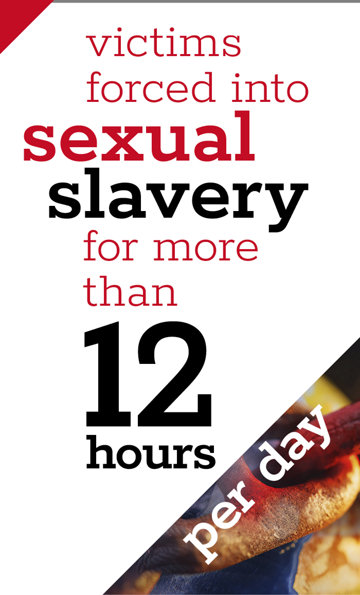Only it wasn’t.
Once victims were hooked, traffickers took them in groups to Japan to obtain Japanese visas, which allowed them to enter Taiwan as tourists. But upon arrival, their passports were confiscated and they were forced to pose for erotic ads, then made to work as prostitutes for more than 12 hours a day—for as little as six US dollars daily.
Under the plan, trafficking victims are granted immunity for crimes committed as a direct result of enslavement.
Escape was impossible. Traffickers threatened them with crushing “debts” they would have to work off if they tried to flee. Such bogus loans are a vicious tool of modern slavery: Victims are told they owe tens of thousands for transportation, food, housing, medical care and inflated “placement fees” of up to $14,000 USD. These “loans” are calculated at up to 100 percent interest, making repayment impossible, and the debts are enforced with brutality—violence, rape, forced labor and illegal confinement.
One victim died of heart failure in a hospital bed, grateful, in her last moments, to be free from her captors, if only through death.
Another managed to escape in February, with the help of a male client, later alerting the Indonesian Economic and Trade Office to Taipei.
Authorities acted. On September 3, the Taipei District Prosecutors Office indicted eight people for trafficking Indonesian women to Taiwan for sexual exploitation.
The gang had been luring and enslaving women since 2023. The charge was human trafficking and engaging in organized crime.
Prosecutors have requested confiscation of illegal profits and are seeking prison sentences of two to six years.

The case highlights a broader crackdown: In recent years, Taiwan has tightened the screws on traffickers, raising sentences to up to seven years in prison, with fines exceeding $150,000 USD—on par with the punishment for rape.
The government has also rolled out an “Anti-Exploitation Action Plan” designed to prevent sex trafficking and forced labor, improve protections for victims, and provide better training for prosecutors and investigators.
Under the plan, trafficking victims are granted immunity for crimes committed as a direct result of enslavement. When they testify against their captors, they are provided with protection, anonymity and ultimately resettlement services.
In late August, Taiwan reaffirmed this commitment on the world stage. At the Taipei City International Conference on Strategies for Combating Human Trafficking, Deputy Minister Ma Shih-Yuan of Taiwan’s Ministry of the Interior said that Taiwan has expanded cross-border cooperation to combat trafficking across the Asia-Pacific.
For the women deceived by promises of “opportunity,” Taiwan’s tough new stance could mean the difference between lifelong bondage and a chance at freedom.






















